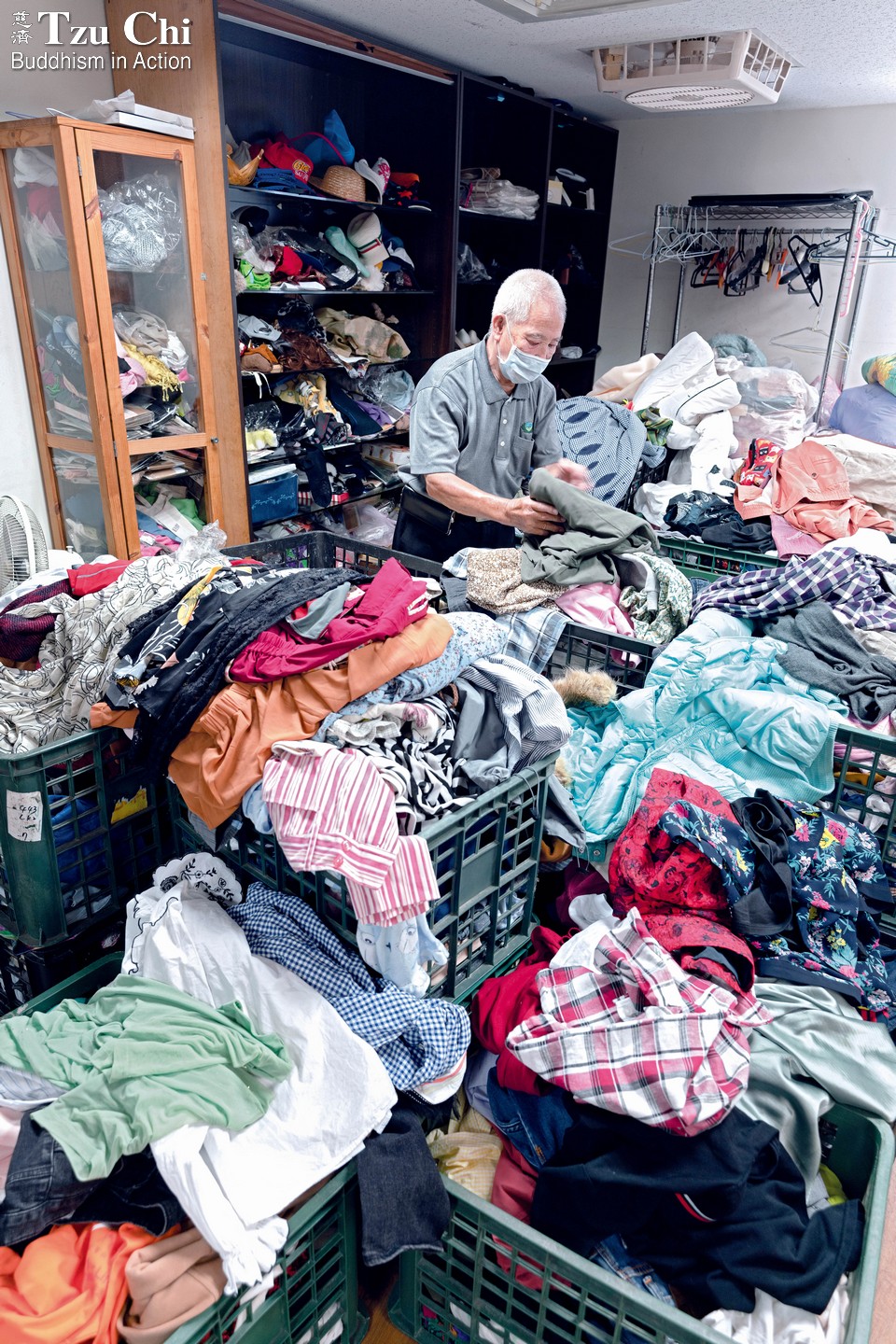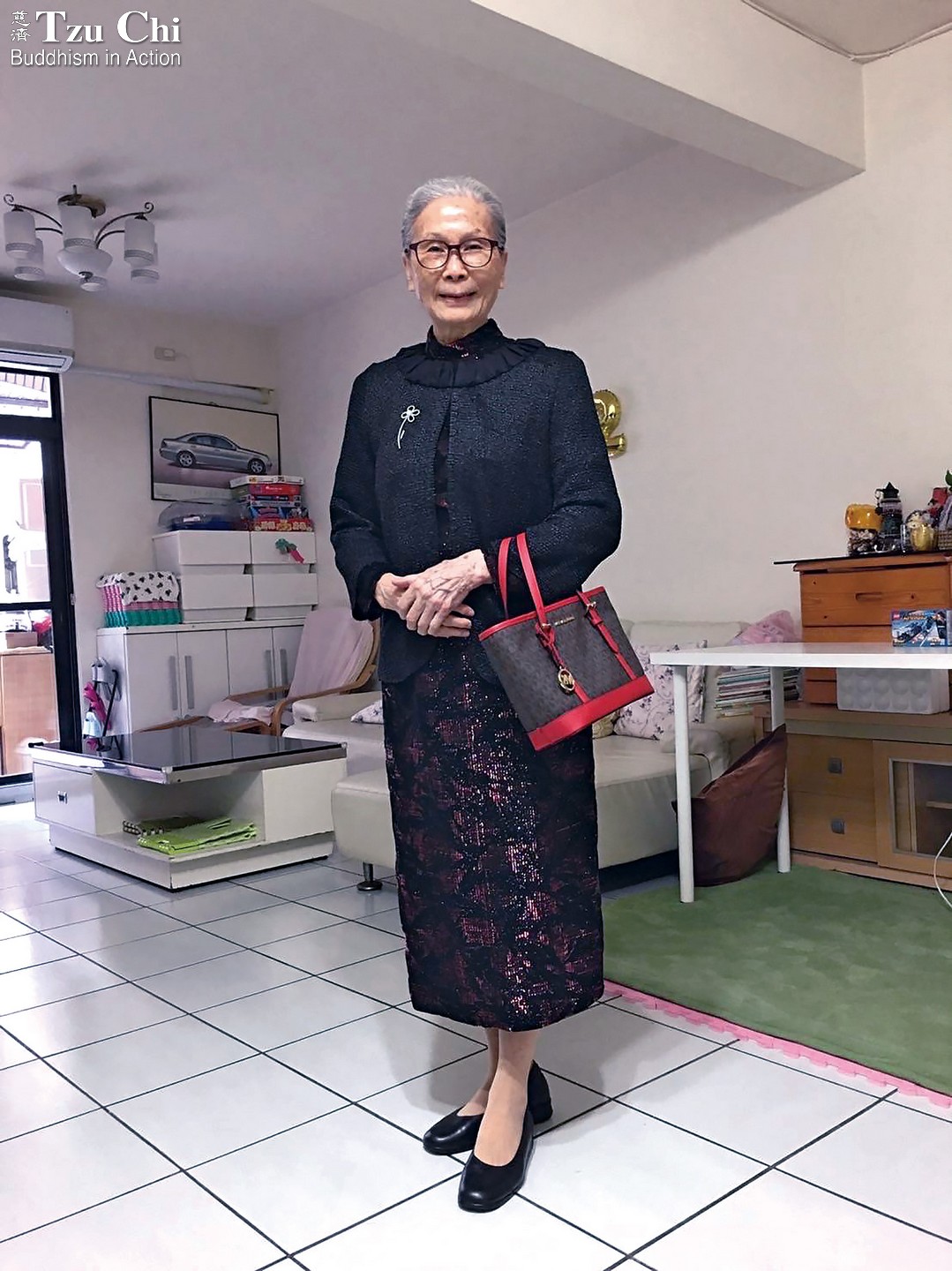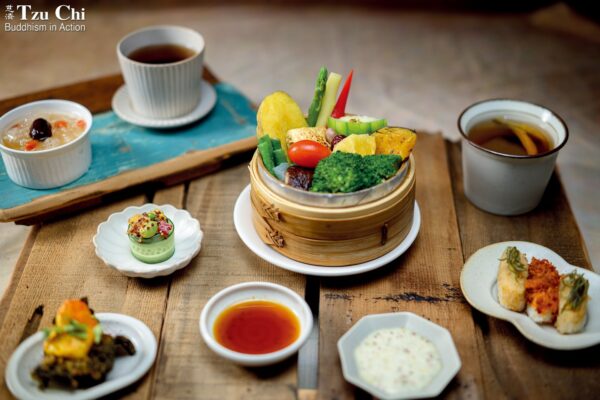By Yeh Tzu-hao
Translated by Wu Hsiao-ting
Photo by Hsiao Yiu-hwa
If you want to save money and reduce your impact on the environment, shopping for secondhand clothes might be a good choice.
It was near noon on a Friday. Taking advantage of the lighter traffic, Mrs. Gao, 72, traveled from her home to the Tzu Chi Bade Recycling Station in the Zhongshan District, Taipei, northern Taiwan. She is familiar with the thrift store at the recycling station. She knew there were many “treasures” to find there.
Pulling her grocery cart, she leisurely browsed the store for secondhand clothes, not just for herself, but also for her son, daughter-in-law, sister, and a second-grade granddaughter. She knew their sizes by heart, and she could always find something suitable for them at the store.
“There are a lot of items to choose from and the prices are such a bargain,” said Mrs. Gao. “I always have a great time shopping here, and everyone is happy about what I find for them. My son, daughter-in-law, sister, and I get almost all our clothes here.” She was also very satisfied with the quality of the clothes in the store. For her, secondhand didn’t have to mean second quality. “I’ll come again when we find ourselves in need of clothes again.”
Reducing waste
The Bade Recycling Station is located in the city center of Taipei, close to many high-end communities. Chen Song-tian (陳松田), one of the volunteers there, said that that’s why the used clothing that ends up at the Bade station is of a better quality than those at other locations. Every time a new batch of clothes donated by community residents arrives at the station, volunteers pick out the items in the best shape for the thrift store there.
The clothes are not only nice, but economical as well. An item of clothing priced at 300 New Taiwan dollars (US$10) at a regular shop might go for just a few dozen NT dollars at the thrift store, so it’s a good place to shop for those who want to help reduce waste or who are on a tight budget. Before the COVID-19 pandemic, because of the low prices, many foreign migrant workers would patronize the store; some even went on shopping sprees to buy gifts for their relatives and friends in their home countries. Many Tzu Chi volunteers made purchases there too. When a wedding was coming up, for example, they knew they might chance upon some inexpensive special occasion wear and accessories there.
“The garments we wore to our daughter’s and son’s weddings were all purchased here,” said Xiao Xiu-zhu (蕭秀珠), Chen Song-tian’s wife. “You help conserve resources by shopping here, save some money, and support a charitable cause, all at the same time.” It is, in other words, a win-win-win.
A lot of garments end up at the station, so the display area in the thrift store is always packed with attire. More clothes lie off to one side in unorganized heaps, waiting to be sorted. Clothes not chosen for sale are set aside for recycling dealers. After the dealers take their pick, any remaining apparel is handed over to the city’s sanitation workers to be disposed of for a fee.

Heaps of clothes wait to be sorted in the thrift store at the Tzu Chi Bade Recycling Station in Taipei. Some are so new they still have their price tags attached.
“We are grateful that the recycling dealers are still willing to come by to take their pick,” Chen Song-tian said. “The collections at some places are of such inferior quality that the dealers don’t even bother to go in.” The dealers, who purchase the clothes by weight, typically visit the station every Friday.
The going rate for recycled clothes is currently among the lowest of all recyclable items, fetching even less money than plastic bags—just two Taiwanese dollars (US$0.07) per kilogram. The dealers take away less than half of the clothing, so a good part of what ends up at the station is ultimately collected by sanitation workers and incinerated.
Though it isn’t easy, volunteers do their best to keep the current operational model going. “We don’t really care about how much money we can make,” said Chen. “We just don’t want things to go to waste. We hope to prolong the lifespan of things as much as possible.”
Discarded clothes likewise cram the racks at the thrift store at the Tzu Chi Xiufeng Recycling Station in the Xizhi District, New Taipei City, northern Taiwan. That station stopped taking in used clothes last May, when Taiwan’s COVID-19 alert was raised to level three, so all the clothes at the station were from the time before. Even so, it’s not difficult to find something you fancy from the large collection there if you are patient.
It’s mostly housewives who shop at the thrift store, said volunteer Liu Yue-e (劉月娥). Foreign migrant workers frequent the location too. “We charge less money from the migrant workers, since they make less money.” Similarly, street people needing clothes can get them for free at the station, which goes for other disadvantaged groups as well.
Prior to the level three alert, community residents notified volunteers at the station whenever they had clothing to donate. Volunteers would then go pick up the clothing from the donors. Other donors just dropped bags of used clothes at the door of the station. As to the quality and condition of the clothes inside, no one could know until the bags were opened.
“Some were in pretty good condition, very clean and neatly folded,” said volunteer Chen Qiong-ling (陳瓊玲). “Some bags contained pitifully few clothes that were still serviceable. Some clothes were even covered in dog or cat hair, or mixed with regular garbage.”
Secondhand, but still good
Lin Qiu Xiu-rong (林邱秀絨), an 85-year-old Tzu Chi volunteer, has found great bargains at the Xiufeng Recycling Station. She once came upon a cheongsam there that was perfect for her, shortly before her granddaughter’s wedding.
Lin Qiu was married into a notable family in Guanshan, Taitung County, southeastern Taiwan, when she was young. The wealth of her husband’s family allowed her to lead an affluent life, but that ended when his business failed. Afterwards, she worked as a caregiver, a cleaning lady, and did other jobs to help support her family. It was only after she turned 70, when her eldest son had become successful in business and all her grandchildren had grown up, that she began breathing easier in life.
After she had lived frugally for decades, the only formal wear in her wardrobe was a blue dress and a cheongsam—both Tzu Chi uniforms. When her granddaughter was getting married, she knew she would have to find herself something else to wear to the wedding. Naturally, she went to the thrift store at the Xiufeng Recycling Station.
“I’m used to dressing casual,” said Lin Qiu, “but a wedding is a big deal after all. Happily, I found a cheongsam at the recycling station that really became me and that suited the occasion. I needed some outer wear to go with it, but Sister Qiong-ling happened to have a black jacket that she had never worn and that matched my cheongsam.” So, voilà, she was able to show up at the wedding looking very nice. No one could tell that her mandarin gown was recycled. Even her granddaughter didn’t find out about it until after her wedding.
“I also found the clothes I’ll wear to my grandson’s wedding at the recycling station—one for the summer and one for the winter,” she said. She had a close brush with death in the train derailment accident that occurred in eastern Taiwan last April. After that experience, she let go of all attachments to material possessions. She even plans to donate the clothes she purchased at the recycling station back to it so that more people can use them.
In a world where overconsumption dominates, maybe we can all learn a thing or two from people like Lin Qiu. Shopping secondhand is sometimes preferable to buying new and one of the easiest ways to a greener planet.

A recycled cheongsam and a borrowed jacket allowed Lin Qiu Xiu-rong to look good for her granddaughter’s wedding. Courtesy of Lin Qiu Xiu-rong



